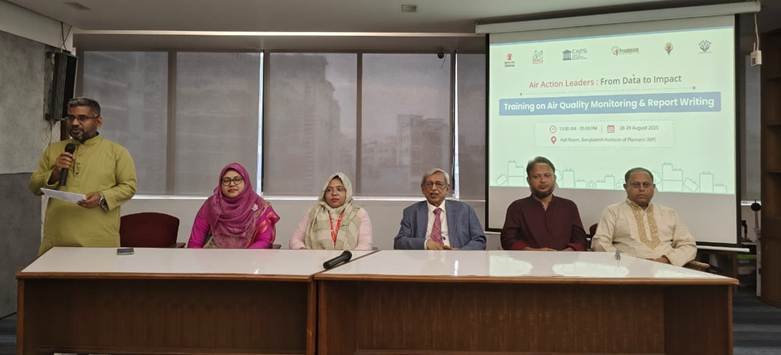
A recent Air Quality Life Index (AQLI) report by the University of Chicago's Energy Policy Institute found that air pollution reduces Bangladesh's average life expectancy by 5.5 years, making it the greatest external threat to life expectancy and more impactful than smoking or malnutrition.
To address this critical issue, the Center for Atmospheric Pollution Studies (CAPS), in collaboration with the National Alliance on Cities for Children and Youth and Save the Children in Bangladesh, organized a two-day training program titled “Air Action Leaders: From Data to Impact – Training on Air Quality Monitoring and Report Writing” on 28–29 August, from 10:00 AM to 5:00 PM at the Hall Room of the Bangladesh Institute of Planners (BIP). The workshop aimed to enhance the skills of youth in air quality monitoring and report preparation, combining important theoretical modules with practical, hands-on training. The youth mobilization partners for this program included Prochesta Foundation, Amrai Agami, and the Youth Foundation of Bangladesh.

The closing and certificate distribution ceremony was attended by Professor Dr. M. Feroze Ahmed, Emeritus Professor, Stamford University Bangladesh, Professor Dr. Abdus Salam, Department of Chemistry, University of Dhaka, Professor Dr. Adil Muhammad Khan, President, BIP, Associate Professor Dr. Mst. Mahmuda Parvin, Chairman, Department of Environmental Science, Stamford University Bangladesh and Nasrin Akter, Manager (Resilience & Climate Change), Save the Children Bangladesh.
Instructors included Professor Dr. Ahmad Kamruzzaman Majumder, Chairman, CAPS; Dr. Ershadul Haque, Professor & Head, Community Medicine & Public Health, Marine City Medical College & Hospital; Assistant Professor Mahmuda Islam, Department of Environmental Science, Stamford University Bangladesh; Syed Mahbubul Alam, Secretary, CLPA; Abdullah Al Nayeem, PhD Researcher, Oregon State University, Md. Nasir Ahmmed Patoary, Lecturer, Department of Environmental Science, Stamford University Bangladesh; and Marziat Rahman, Lead Researcher (Pollution & Climate Change), CAPS. Participants received hands-on training in the use of automated and manual machines for air quality data collection, data analysis, and report preparation.
Prof. Dr. M. Feroze Ahmed highlighted that air pollution is a serious problem in Bangladesh, negatively impacting public health and the environment. With proper policies and effective measures, the situation can be improved. Engaging youth in this effort can quickly lead to better air quality nationwide.
Prof. Dr. Ahmad Kamruzzaman Majumder emphasized that while air pollution significantly contributes to climate change, it often receives less attention in training programs focused on environmental issues. Youth must be aware of air pollution for the sake of national interest and personal safety.
Prof. Dr. Abdus Salam noted that research and technology alone cannot solve Bangladesh’s air pollution problem; active involvement of skilled and aware youth is essential. He expressed confidence that the training has equipped participants to scientifically monitor air quality, analyze data, and prepare reports, which will help raise public awareness and open new research horizons.
Prof. Dr. Adil Muhammad Khan suggested that increasing the use of renewable energy, adopting eco-friendly technologies in transport and industry, and raising public awareness could be an effective solution to air pollution in Bangladesh, ensuring a healthy and green environment for current and future generations.
Associate Prof. Dr. Mst. Mahmuda Parvin reiterated the role of youth as the architects of tomorrow and emphasized the importance of awareness for both national interest and personal safety.
Nasrin Akter, Save the Children Bangladesh, stated that youth are not only future leaders but also agents of change today. Properly trained youth can play an active role in air quality monitoring, awareness-raising, and holding authorities accountable for clean air.
Assistant Prof. Mahmuda Islam stressed that air pollution is a global issue, not just local or regional. Real-time monitoring enables people to protect themselves from potential health hazards. Tools like the Air Quality Index (AQI) provide immediate awareness of air quality conditions.
Lecturer Md. Nasir Ahmmed Patoary provided hands-on training on data collection using automated and manual machines, Q&A methods, as well as data analysis and report writing techniques.
Dr. Ershadul Haque highlighted the severe health risks associated with air pollution, including respiratory issues, cancer, heart disease, and complications for pregnant women. He urged collective awareness to secure a clean and healthy environment for future generations.
Syed Mahbubul Alam, CLPA, emphasized that air pollution is a major crisis affecting public health and human rights. Strict enforcement of existing environmental laws, along with active youth participation, is crucial for effective air pollution control in Bangladesh.
Abdullah Al Nayeem, PhD Researcher, Oregon State University, introduced GIS and remote sensing as powerful tools to access global environmental data for research and analysis.
CAPS Lead Researcher Marziat Rahman, concluded by stressing that youth engagement, technology-based solutions, and advocacy are vital to combating air pollution, protecting health, and ensuring sustainable development.



